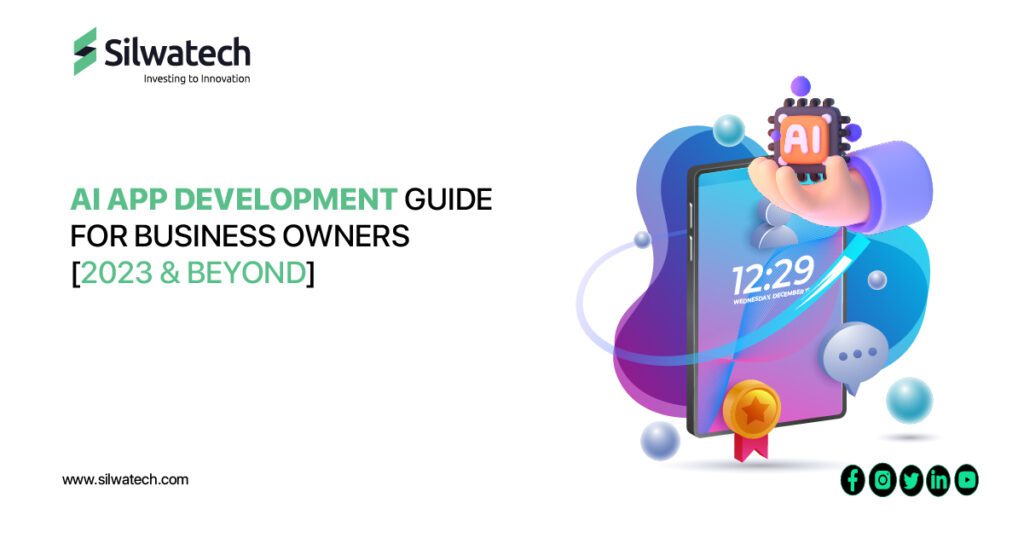Artificial Intelligence (AI) has revolutionised how businesses operate and has become an indispensable tool for many organizations. However, developing an AI app can be a complex and challenging process. With the rapid advancements in AI technology, it’s essential for mobile app developers to understand its potential and learn how to incorporate AI into their app development process. This article aims to provide an overview of the basics of AI mobile app development, the benefits and challenges, and the steps involved in creating an AI-powered mobile app.
What is AI?
Artificial Intelligence (AI) is a branch of computer science focused on building systems that can perform tasks that typically require human intelligence, such as visual perception, speech recognition, decision-making, and language translation. AI systems are trained on vast amounts of data and use algorithms to recognize patterns and make predictions.
The goal of AI is to create machines that can work and learn like humans, and its applications are widespread, including self-driving cars, customer service chatbots, and personalised recommendation systems. AI is rapidly transforming many industries and has the potential to revolutionise the way we live and work.
Application of AI in Various Industries & its Benefits

Healthcare
AI helps with predictive diagnosis, helping physicians identify diseases early and provide faster treatment. It is also employed to create personalised treatment plans, tailoring treatments based on individual patient needs.
The drug development process has also sped up using AI algorithms, drug discovery, and analysis of large amounts of data. Telemedicine, using AI-powered virtual assistants and chatbots, provides remote patient care.
Finance
AI finds applications in the finance sector in many ways. Here are some of them:
- Fraud detection using AI algorithms to identify and prevent fraudulent activities in real-time. Risk management using AI to analyse data
- makes informed investment decisions, risks, etc.
- Customer service and wealth management using AI provide personalised recommendations and portfolio management.
Retail
AI algorithms work in the retail industry to create personalised recommendations of products based on customer preferences and behaviour.
Demand forecasting using AI is used to predict customer demand and optimise inventory levels. Inventory management and supply chain optimization using AI to optimise supply chain operations, reduce waste, improve delivery times, and increase efficiency.
Manufacturing
AI-powered systems are used for predictive maintenance, which predicts when equipment is likely to fail and schedules maintenance in advance. Quality control, using AI to inspect products for defects and improve overall quality. Efficiency is also increased in the production process via optimization.
Transportation
AI is revolutionising the transportation industry by developing autonomous vehicles and optimising traffic patterns and delivery routes. Self-driving cars and trucks use AI algorithms to make decisions and navigate the road. AI is also used to predict traffic patterns, reducing congestion and improving safety. AI also makes route optimization possible, ensuring efficient and quick deliveries.
Education
AI is transforming education by providing personalised learning experiences for students. AI algorithms are used to customise learning programs to each student’s individual needs and abilities. Online tutoring is also improved with AI-powered virtual tutors, offering personalised support and guidance. AI is also used in assessment, grading assignments, and providing instant feedback to students, improving the overall learning process.
Marketing
AI is applied in marketing by enabling customer segmentation based on behaviours and preferences. This allows for personalised marketing campaigns that target each customer segment with relevant and tailored messages. AI is also used in sentiment analysis, analysing customer feedback to determine customer satisfaction levels and improve customer experience. With AI, companies can provide more targeted and effective marketing strategies to engage their customers better.
Agriculture
AI algorithms optimise crop yields and resource usage, resulting in better yields and improved efficiency. AI-powered yield prediction helps farmers anticipate crop yields based on weather conditions and soil quality, allowing them to make informed decisions. Resource management is also improved with AI, optimising the use of water and fertiliser, reducing waste, and increasing sustainability. With AI, agriculture becomes more efficient, sustainable, and profitable.
Energy
AI algorithms predict renewable energy production, allowing for efficient grid management and optimisation. AI-powered demand prediction helps energy companies anticipate energy demand and optimise supply, reducing waste and costs. Grid optimization is also improved with AI, optimising the distribution of energy and reducing waste. AI makes the energy industry more efficient, sustainable, and profitable.
The Benefits of AI in App Development
AI has the potential to revolutionise the way we develop and use mobile apps. Here are some of the benefits of incorporating AI in app development:

- User Experience: AI algorithms can provide users with personalised experiences based on their preferences, behaviours, and habits. This includes personalised content recommendations, custom interfaces, and more.
- Improved Efficiency: AI algorithms can automate time-consuming tasks, freeing up developers to focus on more creative and strategic projects. This can increase efficiency and productivity and speed up the app development process.
- Predictive Analytics: AI can provide valuable insights into app usage and user behaviour through predictive analytics. This data can be used to improve app performance and make informed decisions about future updates and improvements.
- Automated Testing: AI can automate the testing process, reducing the time and effort required to test apps thoroughly. This allows for faster and more comprehensive testing, resulting in higher-quality apps and faster time-to-market.
- Personalization: AI algorithms can personalise apps for users, offering individualised experiences and increasing engagement and retention. Personalization can range from custom interfaces and content recommendations to personalised notifications and reminders.
- Voice and Image Recognition: AI-powered voice and image recognition can be integrated into apps to provide users with an even more convenient and immersive experience. This can include voice commands, image search, and more.
- Real-time Responsiveness: AI algorithms can allow apps to respond in real time to user requests and provide instant feedback. This can significantly improve the user experience and increase engagement and retention.
- Cost Savings: By automating time-consuming tasks and reducing the need for manual labour, AI can help app developers save time and resources, resulting in cost savings.
Use of AI in Mobile Apps
Using AI in apps was probably the first instance that proved the revolutionary capabilities of this technology. Many popular mobile apps use AI technology to provide innovative and user-friendly experiences. Here are some examples:
- Siri (Apple): Siri is a virtual personal assistant that uses NLP and machine learning to understand and respond to user requests. Siri can answer questions, set reminders, and perform other tasks on behalf of the user
- Google Assistant (Google): Google Assistant is a virtual personal assistant that uses NLP and machine learning to understand and respond to user requests. Google Assistant can answer questions, set reminders, and perform other tasks on behalf of the user.
- Amazon Alexa (Amazon): Amazon Alexa is a virtual personal assistant that uses NLP and machine learning to understand and respond to user requests. Amazon Alexa can answer questions, set reminders, and perform other tasks on behalf of the user
- Snapchat (Snap Inc.): Snapchat uses computer vision and augmented reality technology to provide users with an immersive and interactive experience. Snapchat allows users to add filters, lenses, and other virtual elements to their photos and videos.
- Pokemon Go (Niantic Inc.): Pokemon Go is a popular augmented reality game that uses computer vision technology to superimpose virtual elements onto the physical world. Pokemon Go allows players to catch virtual creatures and explore their real-world surroundings.
- Netflix (Netflix Inc.): Netflix gives personalised content recommendations using machine learning and predictive analytics. Netflix algorithms analyse user data to determine the movies and TV shows that users are likely to enjoy
- Uber (Uber Technologies Inc.): Uber uses machine learning and predictive analytics to optimise its ride-hailing service. User data is analysed by the algorithms to find the most efficient routes and match riders with drivers in real-time.
- Spotify (Spotify AB): This popular music platform provides personalised music recommendations using machine learning and predictive analysis. Spotify algorithms analyse user data to determine the songs and artists users are likely to enjoy.
Steps in AI App Development
Developing an AI-powered app requires careful planning and execution. By following these steps, you can create an app that will provide a great user experience and help your business grow incredibly.
Identify a Problem
The first step in developing an AI-powered app is identifying a problem you want to solve. This could be anything from improving the user experience to optimising business processes. By identifying the problem, you can then determine how AI can be used to solve it.
Select an AI App Development Company
Once you have identified a problem, you need to select a development company with experience building AI-powered apps. Look for an app development company that has a proven track record in developing AI solutions and that has a team of experts who can help you bring your idea to life.
Design an App
The next step is to design your app. Work with your development company to create a user-friendly interface that is easy to navigate and will provide an excellent experience for your users. Make sure to consider the various features and functionalities you want to include, such as voice recognition, image recognition, and natural language processing.
Create an AI Algorithm
The heart of any AI-powered app is the AI algorithm. Work with your development company to create an algorithm to solve your identified problem. The algorithm should be designed to learn from data and continually improve.
Choose Tech Stack
When developing an AI-powered app, you need to choose the right tech stack. This will determine the programming languages, tools, and platforms you will use to build your app. Some popular tech stacks for AI include TensorFlow, PyTorch, etc.
Launch and Maintain Your App
Finally, it’s time to launch your app. Work with your development company to ensure that the app is launched smoothly and is easy to use. Make sure to monitor the app regularly and to make any necessary updates or improvements. You can ensure that it remains relevant and effective over time by continually monitoring and improving the app.
Wrapping Up
AI app development is a cutting-edge field that requires a deep understanding of both technology and business needs. If you’re looking for a reliable AI app development company to bring your ideas to life, consider Silwatech.
With our expertise in AI app development, we can help you design, develop, and launch a high-quality app that meets your needs and exceeds your expectations.
As a leading AI app development company in Dubai, we have the skills, resources, and experience to help you take your business to the next level. Contact us today to learn more about our AI app development services.




















